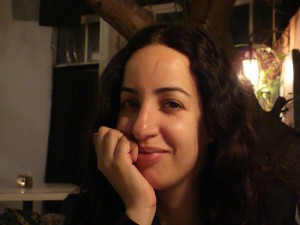
Mondoweiss, December 28, 2009
This is the first installation in a seven-part series. See the above link for details.
It was the avocadoes that made Sivan question things. The moshav she grew up on had three varieties—Haas, Fuerte, and HaNatoush. “HaNatoush,” Fridman repeats. “The abandoned.”
As a child, she didn’t understand why avocadoes would bear such a name. But when she rode horses through the fields, she noticed other abandoned things. There were stone remains of a village. They reminded her of the Old City in Jerusalem. “You don’t realize that they’re sort of new,” Fridman recalls.
When Fridman was 14 and attending school on a nearby kibbutz, she learned about the Arab-Israeli War of 1948. “I thought it was a kind of avocado. It was a shock to realize these lands were ‘abandoned’ in 1948.” Fridman became aware, too, that Palestinians hadn’t left their land as willingly as the agricultural nomenclature might imply.
Upset about this part of her country’s history, Fridman looked up the property records of her moshav. She was happy to learn that some of the land was purchased from Arabs in 1933, including the plot her parents’ house was built on. “These lands were legally owned,” she says. But some were not.
For Fridman, the granddaughter of four Holocaust survivors, “coming to terms with everything was a process.”
Her understanding and definition of Zionism changed. But it wasn’t abandoned. “Being a Zionist is something primal for me,” she says. “It’s who I am; it’s who I was raised to be.”
Today, Fridman, 29, is a counselor for a program that brings Jewish volunteers from the Diaspora to Israel to work with needy populations in Tel Aviv and Yafo, the adjacent Arab city.
Some of these visitors end up staying, becoming “immigrants, not olim,” Fridman emphasizes. Though she dislikes the term “aliyah” because it implies exclusivity, she is not ashamed she has facilitated immigration. “I don’t think we [Jews] shouldn’t live here. But the meaning of Zionism isn’t to build settlements,” Fridman says. “The meaning of Zionism is to fight for how you want the country to look.”
Fridman points to Tel Aviv, hotbed of activism and host to organizations like that she is employed by, which emphasizes pluralism, social justice, and Judaism’s humanistic values. This is the future of Zionism, she says. “The new kibbutzim are in the cities.”
The series was printed in its entirety in the Fall 2009 print edition of Zeek, Israelology, which was distributed to J-Street conference attendees.